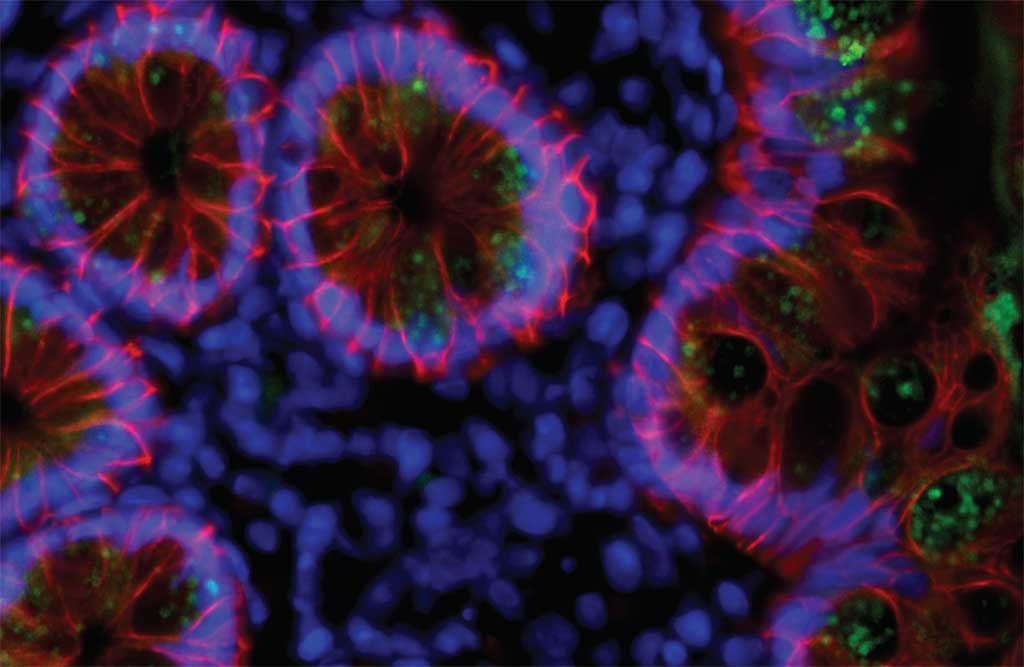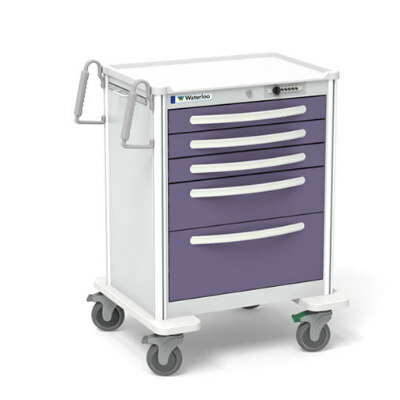COVID-19 Immunity Lasts Six Months or More, Reveals New SARS-CoV-2 Antibody Analysis
|
By HospiMedica International staff writers Posted on 13 Nov 2020 |

Image: Scientists found traces of SARS-CoV-2 (green) in cells lining people’s intestines three months after infection. Antibodies may evolve in response to these residual viral traces (Photo courtesy of C. Gaebler et al)
A new antibody analysis has revealed that people who have recovered from coronavirus can make potent antibodies to SARS-CoV-2 that evolve in the months after infection in response to residual viral antigen hidden in the gut.
The antibody analysis by immunologists at the Howard Hughes Medical Institute (Chevy Chase, MD, USA) has shown that people who doctors consider to be recovered from COVID-19 produce SARS-CoV-2 virus-fighting antibodies that rapidly evolve in the months following an infection. The results suggest that the immune systems of people previously infected with COVID-19 might have defenses ready if exposed to the SARS-CoV-2 virus again.
For their antibody analysis, the team of immunologists began recruiting people who had recovered from COVID-19 in April during the height of the pandemic in New York. The researchers collected blood from 149 participants and combed it for immune cells that make protective antibodies - those that zero in on the virus and block its entry into cells. These antibodies might also serve as a blueprint for a new drug - molecules that scientists could purify, produce in mass quantities, and then give to patients to prevent or treat COVID-19.
The researchers found that one month after infection, all the 149 participants had coronavirus-fighting antibodies. The level of these antibodies in the blood was generally low, but their presence in so many people was a bright sign for vaccine development. A vaccine that boosts production of these antibodies could be effective in a broad population of people, the team suggested.
The researchers took a closer look at the antibodies of six participants and discovered antibodies that were especially effective. The team has conducted more than a dozen studies examining two of these exceptional antibodies. In a study, the researchers found that when combined in a cocktail, they can protect mice from SARS-CoV-2 infection. The team has also seen promising results in rhesus macaques. The team is now planning a Phase 1 clinical trial to test the safety of the antibodies in people although a potential therapy could still be a long way off.
“The really good news is that people who are infected are very unlikely to become sick again for at least six month,” said Michel Nussenzweig, an investigator at the Howard Hughes Medical Institute and an immunologist at The Rockefeller University.
“Our results showed that it’s not hard for our immune systems to make effective antibodies to SARS-CoV-2,” said Christian Gaebler, a physician and immunologist in Nussenzweig’s lab.
Related Links:
Howard Hughes Medical Institute

The antibody analysis by immunologists at the Howard Hughes Medical Institute (Chevy Chase, MD, USA) has shown that people who doctors consider to be recovered from COVID-19 produce SARS-CoV-2 virus-fighting antibodies that rapidly evolve in the months following an infection. The results suggest that the immune systems of people previously infected with COVID-19 might have defenses ready if exposed to the SARS-CoV-2 virus again.
For their antibody analysis, the team of immunologists began recruiting people who had recovered from COVID-19 in April during the height of the pandemic in New York. The researchers collected blood from 149 participants and combed it for immune cells that make protective antibodies - those that zero in on the virus and block its entry into cells. These antibodies might also serve as a blueprint for a new drug - molecules that scientists could purify, produce in mass quantities, and then give to patients to prevent or treat COVID-19.
The researchers found that one month after infection, all the 149 participants had coronavirus-fighting antibodies. The level of these antibodies in the blood was generally low, but their presence in so many people was a bright sign for vaccine development. A vaccine that boosts production of these antibodies could be effective in a broad population of people, the team suggested.
The researchers took a closer look at the antibodies of six participants and discovered antibodies that were especially effective. The team has conducted more than a dozen studies examining two of these exceptional antibodies. In a study, the researchers found that when combined in a cocktail, they can protect mice from SARS-CoV-2 infection. The team has also seen promising results in rhesus macaques. The team is now planning a Phase 1 clinical trial to test the safety of the antibodies in people although a potential therapy could still be a long way off.
“The really good news is that people who are infected are very unlikely to become sick again for at least six month,” said Michel Nussenzweig, an investigator at the Howard Hughes Medical Institute and an immunologist at The Rockefeller University.
“Our results showed that it’s not hard for our immune systems to make effective antibodies to SARS-CoV-2,” said Christian Gaebler, a physician and immunologist in Nussenzweig’s lab.
Related Links:
Howard Hughes Medical Institute

SARS‑CoV‑2/Flu A/Flu B/RSV Sample-To-Answer Test
SARS‑CoV‑2/Flu A/Flu B/RSV Cartridge (CE-IVD)
Latest COVID-19 News
- Low-Cost System Detects SARS-CoV-2 Virus in Hospital Air Using High-Tech Bubbles
- World's First Inhalable COVID-19 Vaccine Approved in China
- COVID-19 Vaccine Patch Fights SARS-CoV-2 Variants Better than Needles
- Blood Viscosity Testing Can Predict Risk of Death in Hospitalized COVID-19 Patients
- ‘Covid Computer’ Uses AI to Detect COVID-19 from Chest CT Scans
- MRI Lung-Imaging Technique Shows Cause of Long-COVID Symptoms
- Chest CT Scans of COVID-19 Patients Could Help Distinguish Between SARS-CoV-2 Variants
- Specialized MRI Detects Lung Abnormalities in Non-Hospitalized Long COVID Patients
- AI Algorithm Identifies Hospitalized Patients at Highest Risk of Dying From COVID-19
- Sweat Sensor Detects Key Biomarkers That Provide Early Warning of COVID-19 and Flu
- Study Assesses Impact of COVID-19 on Ventilation/Perfusion Scintigraphy
- CT Imaging Study Finds Vaccination Reduces Risk of COVID-19 Associated Pulmonary Embolism
- Third Day in Hospital a ‘Tipping Point’ in Severity of COVID-19 Pneumonia
- Longer Interval Between COVID-19 Vaccines Generates Up to Nine Times as Many Antibodies
- AI Model for Monitoring COVID-19 Predicts Mortality Within First 30 Days of Admission
- AI Predicts COVID Prognosis at Near-Expert Level Based Off CT Scans
Channels
Artificial Intelligence
view channel
AI-Powered Algorithm to Revolutionize Detection of Atrial Fibrillation
Atrial fibrillation (AFib), a condition characterized by an irregular and often rapid heart rate, is linked to increased risks of stroke and heart failure. This is because the irregular heartbeat in AFib... Read more
AI Diagnostic Tool Accurately Detects Valvular Disorders Often Missed by Doctors
Doctors generally use stethoscopes to listen for the characteristic lub-dub sounds made by heart valves opening and closing. They also listen for less prominent sounds that indicate problems with these valves.... Read moreCritical Care
view channel
Stretchable Microneedles to Help In Accurate Tracking of Abnormalities and Identifying Rapid Treatment
The field of personalized medicine is transforming rapidly, with advancements like wearable devices and home testing kits making it increasingly easy to monitor a wide range of health metrics, from heart... Read more
Machine Learning Tool Identifies Rare, Undiagnosed Immune Disorders from Patient EHRs
Patients suffering from rare diseases often endure extensive delays in receiving accurate diagnoses and treatments, which can lead to unnecessary tests, worsening health, psychological strain, and significant... Read more
On-Skin Wearable Bioelectronic Device Paves Way for Intelligent Implants
A team of researchers at the University of Missouri (Columbia, MO, USA) has achieved a milestone in developing a state-of-the-art on-skin wearable bioelectronic device. This development comes from a lab... Read more
First-Of-Its-Kind Dissolvable Stent to Improve Outcomes for Patients with Severe PAD
Peripheral artery disease (PAD) affects millions and presents serious health risks, particularly its severe form, chronic limb-threatening ischemia (CLTI). CLTI develops when arteries are blocked by plaque,... Read moreSurgical Techniques
view channel
Porous Gel Sponge Facilitates Rapid Hemostasis and Wound Healing
The kidneys are essential organs that handle critical bodily functions, including waste elimination and blood pressure regulation. Often referred to as the silent organ because they typically do not manifest... Read more
Novel Rigid Endoscope System Enables Deep Tissue Imaging During Surgery
Hyperspectral imaging (HSI) is an advanced technique that captures and processes information across a given electromagnetic spectrum. Near-infrared hyperspectral imaging (NIR-HSI) has particularly gained... Read more
Robotic Nerve ‘Cuffs’ Could Treat Various Neurological Conditions
Electric nerve implants serve dual functions: they can either stimulate or block signals in specific nerves. For example, they may alleviate pain by inhibiting pain signals or restore movement in paralyzed... Read more
Flexible Microdisplay Visualizes Brain Activity in Real-Time To Guide Neurosurgeons
During brain surgery, neurosurgeons need to identify and preserve regions responsible for critical functions while removing harmful tissue. Traditionally, neurosurgeons rely on a team of electrophysiologists,... Read morePatient Care
view channelFirst-Of-Its-Kind Portable Germicidal Light Technology Disinfects High-Touch Clinical Surfaces in Seconds
Reducing healthcare-acquired infections (HAIs) remains a pressing issue within global healthcare systems. In the United States alone, 1.7 million patients contract HAIs annually, leading to approximately... Read more
Surgical Capacity Optimization Solution Helps Hospitals Boost OR Utilization
An innovative solution has the capability to transform surgical capacity utilization by targeting the root cause of surgical block time inefficiencies. Fujitsu Limited’s (Tokyo, Japan) Surgical Capacity... Read more
Game-Changing Innovation in Surgical Instrument Sterilization Significantly Improves OR Throughput
A groundbreaking innovation enables hospitals to significantly improve instrument processing time and throughput in operating rooms (ORs) and sterile processing departments. Turbett Surgical, Inc.... Read moreHealth IT
view channel
Machine Learning Model Improves Mortality Risk Prediction for Cardiac Surgery Patients
Machine learning algorithms have been deployed to create predictive models in various medical fields, with some demonstrating improved outcomes compared to their standard-of-care counterparts.... Read more
Strategic Collaboration to Develop and Integrate Generative AI into Healthcare
Top industry experts have underscored the immediate requirement for healthcare systems and hospitals to respond to severe cost and margin pressures. Close to half of U.S. hospitals ended 2022 in the red... Read more
AI-Enabled Operating Rooms Solution Helps Hospitals Maximize Utilization and Unlock Capacity
For healthcare organizations, optimizing operating room (OR) utilization during prime time hours is a complex challenge. Surgeons and clinics face difficulties in finding available slots for booking cases,... Read more
AI Predicts Pancreatic Cancer Three Years before Diagnosis from Patients’ Medical Records
Screening for common cancers like breast, cervix, and prostate cancer relies on relatively simple and highly effective techniques, such as mammograms, Pap smears, and blood tests. These methods have revolutionized... Read morePoint of Care
view channel
Critical Bleeding Management System to Help Hospitals Further Standardize Viscoelastic Testing
Surgical procedures are often accompanied by significant blood loss and the subsequent high likelihood of the need for allogeneic blood transfusions. These transfusions, while critical, are linked to various... Read more
Point of Care HIV Test Enables Early Infection Diagnosis for Infants
Early diagnosis and initiation of treatment are crucial for the survival of infants infected with HIV (human immunodeficiency virus). Without treatment, approximately 50% of infants who acquire HIV during... Read more
Whole Blood Rapid Test Aids Assessment of Concussion at Patient's Bedside
In the United States annually, approximately five million individuals seek emergency department care for traumatic brain injuries (TBIs), yet over half of those suspecting a concussion may never get it checked.... Read more
New Generation Glucose Hospital Meter System Ensures Accurate, Interference-Free and Safe Use
A new generation glucose hospital meter system now comes with several features that make hospital glucose testing easier and more secure while continuing to offer accuracy, freedom from interference, and... Read moreBusiness
view channel
Johnson & Johnson Acquires Cardiovascular Medical Device Company Shockwave Medical
Johnson & Johnson (New Brunswick, N.J., USA) and Shockwave Medical (Santa Clara, CA, USA) have entered into a definitive agreement under which Johnson & Johnson will acquire all of Shockwave’s... Read more















